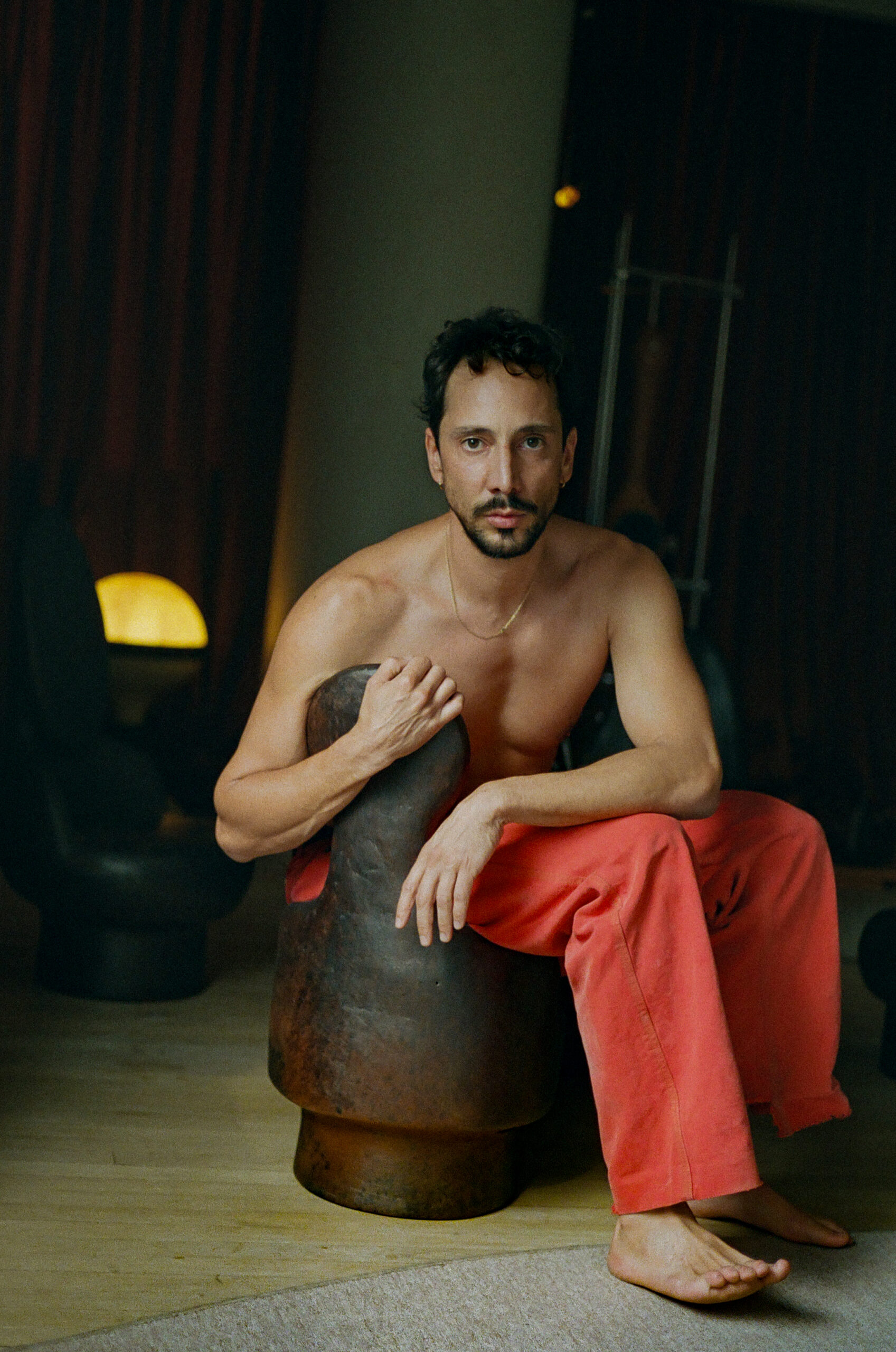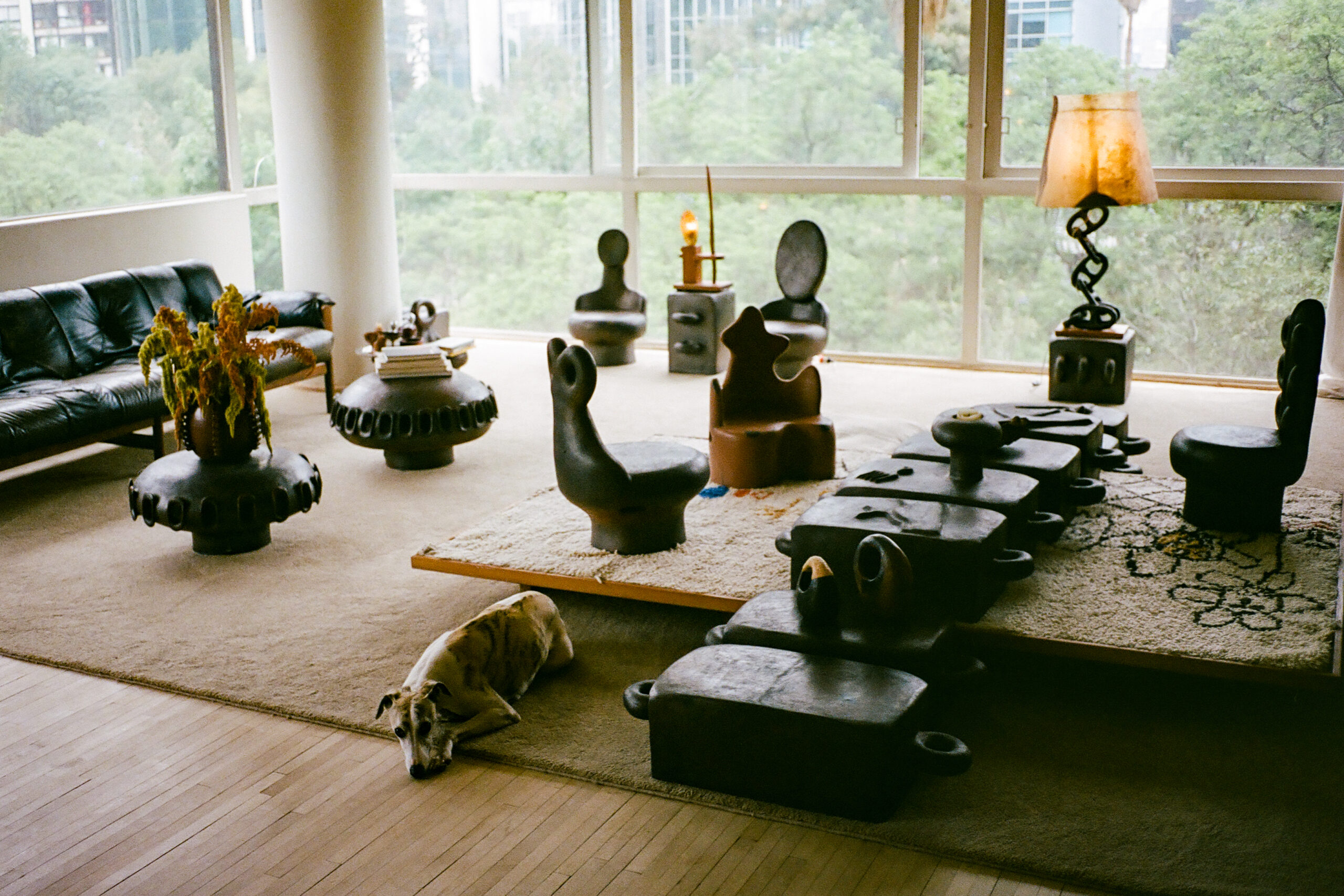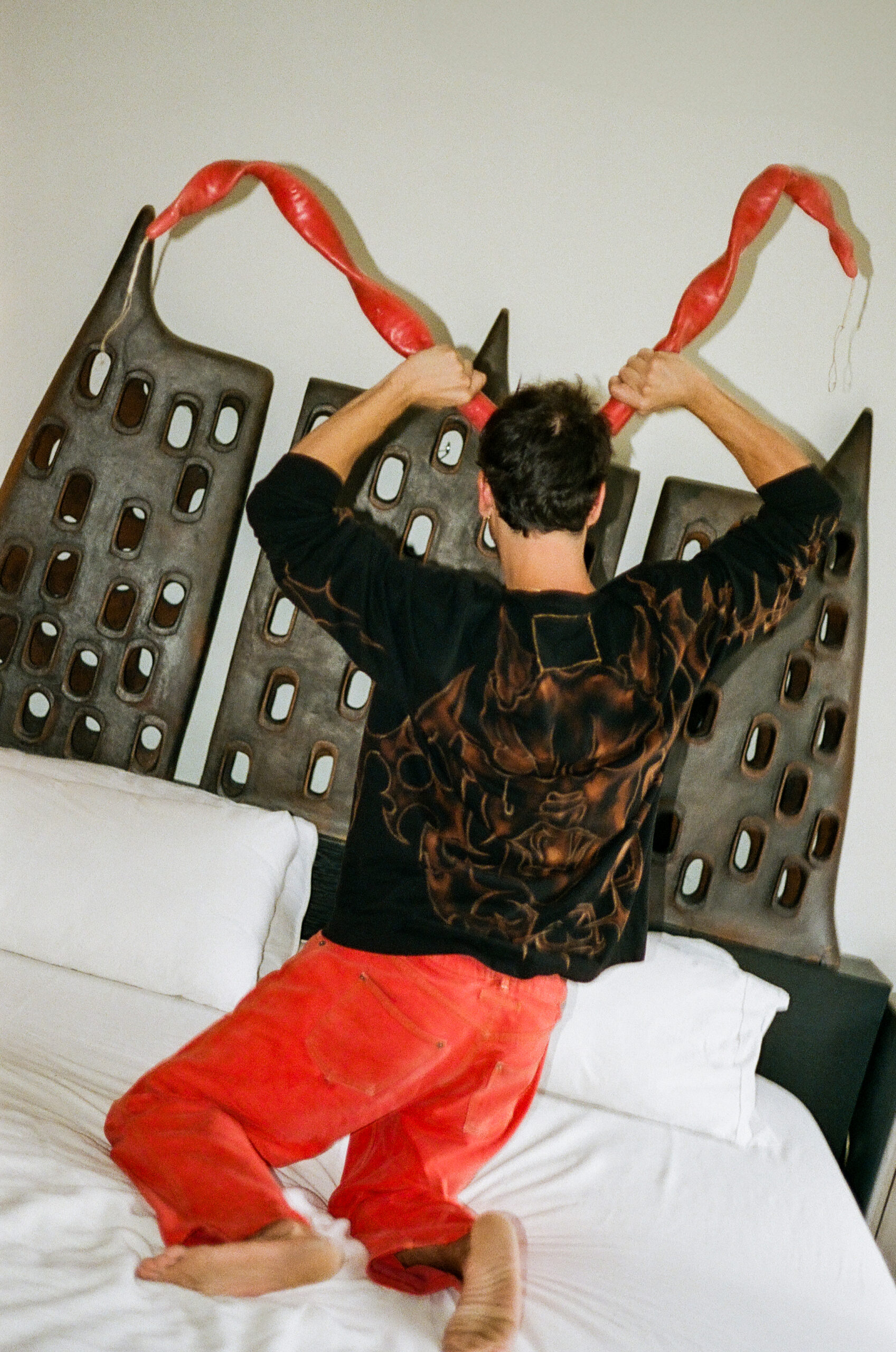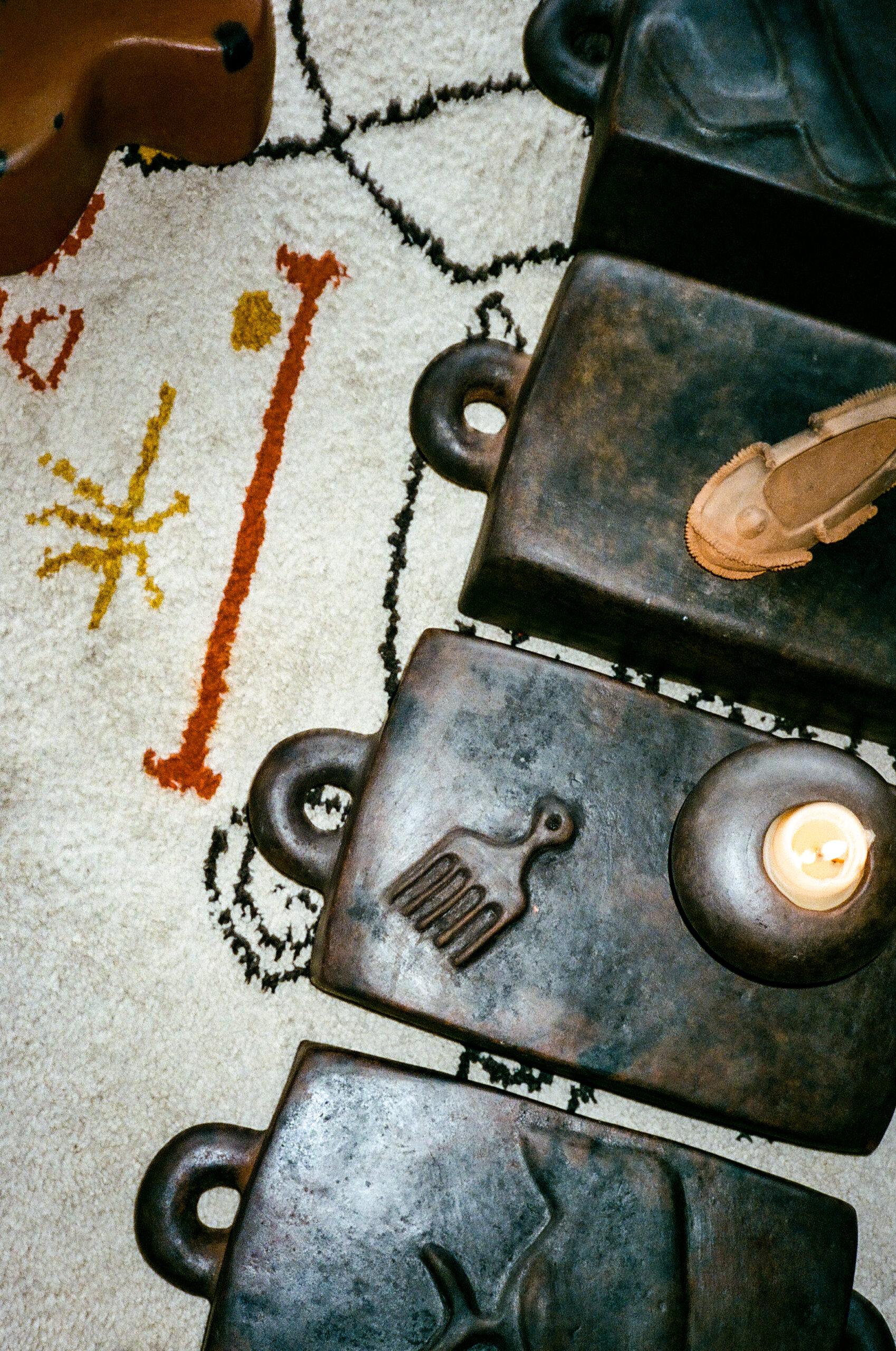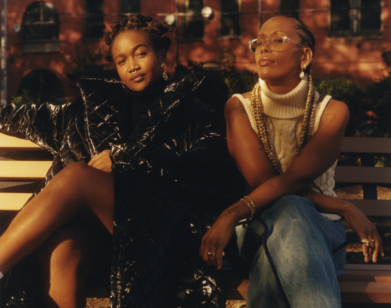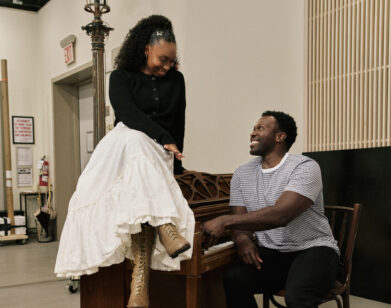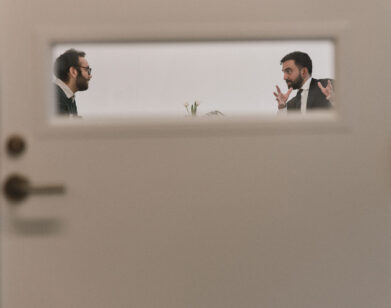DESIGNER
“We Are Naked People”: Designer Pol Agustí, in Conversation With Kimberly Drew
For the production designer turned sculptor Pol Agustí, working alongside traditional artisans is as much about listening as it is about learning a centuries-old craft. In his latest solo exhibition with AGO Projects, Santos de NADA, on view through October 8th in Gramercy Park, the Mexico-based artist transforms local woods, dried gourds, and discarded fiberglass into objects that evoke both sacred iconography and secular devotion. Raised between Spanish atheism and familial Catholic traditions, Agustí sees spirituality as intimate, playful, and communal. “A lot of hands made all these objects,” Agustí told his friend, the curator and cultural critic Kimberly Drew, ahead of his New York show. “It’s about sharing and seeing the visions of other people.”—OLAMIDE OYENUSI
———
POL AGUSTÍ: Hey, so fun that we are doing this.
KIMBERLY DREW: I know. I was so excited. Are you in your fab apartment?
AGUSTÍ: Yes.
DREW: I can’t wait to visit. I know you were just with some of my dear friends, Naomi and Nico.
AGUSTÍ: I was so happy that they were here. Naomi’s energy—
DREW: Absolutely unmatched. I love her because she’s a friend who taught me to be naked.
AGUSTÍ: We are naked people.
DREW: It’s so necessary. It’s a politic that gets crossed over, because there are so many ways that we are expected to perform it. But nakedness allows us particular freedom that I think is lost, especially in cringe culture.
AGUSTÍ: Yeah, I mean for me it’s normal. My parents are naked around me, always. And since we were kids, we were naked with our friends. I can be naked with the mother of my friends and it doesn’t matter.
DREW: I think it’s so important. I think it’s a safety that’s possible when the body isn’t inherently sexualized. Speaking of, you mentioned your parents. It makes so much sense for the beautiful chaos of your mind. You talked about how you were raised atheist but you were secretly baptized. And I wonder if you could talk a bit about that story and what it’s meant for you.
AGUSTÍ: My parents grew up in a Catholic ambience. But then they were hippies and they decided none of their children would be baptized. I was just in Spain for vacation and I spent some time with my grandma and mother. And we were talking about how my grandma wanted to baptize me in the sink, in secret. I think that was a way of my grandma preparing me for a spiritual life, even if my parents blocked it. Arriving in Mexico, it was a little bit overwhelming, the way people speak. Even if they are not Catholic, it is very Primero Dios. That means first god. But step by step, I was liking it. I embrace it. And I think it’s nice to think about lighting a candle for a friend that passed away, or when your friend is going to have a big day. It’s like manifesting, when you’re writing something down that you really want. It’s spiritual, and it helps a lot.
DREW: I was raised with a complicated relationship to religion where the generation older than my parents were Catholic and then very Southern Baptist. And now me and my parents are in different places with it completely. We’re remixing it, because it’s not about this total surrender to god or the blood of Jesus or these intense conceptions of devotion. Like you’re saying, the power of belief is so much more about a counterbalance.
AGUSTÍ: Yes. I think it helps because it projects you in a direction and you don’t feel that alone. You have a little spirituality in your day, but you’re not devoted to a god. I don’t have time for that. [Laughs]
DREW: Too busy living.
AGUSTÍ: How was it when you were a child? Your grandparents were religious and your parents were not?
DREW: They’re going to kill me for this. But it was kind of this “diet religion” where they both knew they had to take me to church, which I am very thankful for because we have a Southern Baptist tradition in Black culture. It’s one of the few places, even though there’s been violence against churches, that there’s freedom for Black people. And so people catch the spirit, people have Holy Ghost, people feel at rest. As opposed to other parts of black public life that are about a smallness and about rigidity and following rules and laws that are centuries old. And so I’m very thankful for that.
AGUSTÍ: I think after going to the extreme, our generation of like, “No, no, no,” is going to come back up with something like, “Hey, let’s do something chill. Be thankful.” If you are not thankful to a god, be thankful to your friends, the doorman of your apartment, the person who fixes a hole on the street so you don’t fall.
DREW: I love. I think the thing that’s fucked up about our generation and younger is a disregard for labor. My family, when we pray over meals there’s often an acknowledgement of the hands that prepare the meal. That’s what I love about your practice, is that you’re very much in acknowledgement of the people who come together to make these gorgeous objects. You’re not working in isolation. Even from the beginning, you’re traveling to Michoacán and working with artisans, and the urgency is inspired by your relationship with Sofía and her loss.
AGUSTÍ: Yeah. Instead of feeling like, “I’m not doing this alone. Is this mine at the end or not?” I’m really embracing all the hands that are participating in it. The cultural shock, it’s heavy. Michoacán is isolated because it’s a very violent zone. People don’t go there really. It’s in a high mountain. So me arriving as a Spanish person, I’m like, “I don’t know if they’re going to like me or they’re going to hate me.” When I went there after my friend passed away, I started meeting all these people and staying in their houses and eating with them. First it was observation, what was this technique they are using? How can I use it for something else? And then I started proposing these chair forms in cardboard so [Miguel, Pol’s collaborator) understands what we need to do. I am learning to have patience. For so many reasons in my life, I’ve been in a rush. But working with different people in this town in Michoacán, you get out of your world. You’re with people talking in a language that you don’t understand. Eating their food, spending time with them. A lot of hands made all these objects. It’s about sharing and seeing the visions of other people. And being open. I’m so happy that I’m not alone in my head just doing one thing. I’m not there with a drawing saying, “This is what I want.” You need to be a little bit more open.
DREW: I think that that’s the connection between mastery and mischief. Craftsmanship is this pursuit of how to do something the best or how to do something within tradition. But I love when there’s room for play and mischief, but also still an understanding that things are made a certain way.
AGUSTÍ: Yeah, I mean Miguel knows the techniques, I do the forms. I’m always like, “Oh, but I need to learn the technique. I need to be bad for a while, then I’m going to be better.”
DREW: “I have to misbehave first!”
AGUSTÍ: Yes. But it’s been so beautiful to see how they do this as a way to survive. It’s their tradition and they are doing this in the house. So it means you are there with all the family, with the pigs screaming next to you, someone cooking next to you. So suddenly you’re a stranger and you’re like, “I’m in the middle of a family.” But seeing how everything happened—the first three chairs that we did just to try were beautiful. It’s been a gift. Because I feel sometimes these people are kind of forgotten in their mountains. I understand that some people are going to be like, “Why are you a white Spanish guy in the mountains of Michoacán doing this?” To be honest, I know what I live and I know it’s beautiful.
DREW: Shout out to you for reversing the colonial instinct where you’re like, “Actually what I want to do is learn. What I want to do is listen.” And another thing I was thinking about too is when it’s looked at as something that Miguel makes, it’s often things that are seen as primitive. The history of a lot of these objects, even 16th century, 17th century Mexican pottery is seen as this primitive thing. And I feel like your work helps challenge that because it’s also intuition. People see primitive as rudimentary. And you’re like, “No, this tradition is the space for learning.” The chair doesn’t exist without the process. The speaker doesn’t exist without the process. Would you say that’s true?
AGUSTÍ: Yes. I don’t know if I understand really, but I kind of like this primitive look. I wanted to make this fake archeological site where you find all these objects that are a mix of cultures that I think is where we are now actually, because everything is so mixed. We found some objects that are related to the court of France, the other are Hispanic, the other are sci-fi movies of the ’70s or the ’80s. I was seeing this guy, it was like a group from K-pop, but he was from Peru or Bolivia and he’s singing his language but it sounds like Korean. I was like, “Oh my god.” I love this kind of thing to mix the things to make it that you don’t understand. It blows my mind.
DREW: An investment in it is almost like cultural wandering. As opposed to the destination being K-pop, it’s like a true kind of unwindy road.
AGUSTÍ: I don’t think things need to be like, “You are from here, you need to eat this.” No, I eat Chinese food and Japanese food every week. You probably do too. And it’s fine. I love the mix of culture—with respect and admiration. But I had this all my life. I’ve been traveling since I was very young. I always go to the extreme that I want to know and meet people. “Can I stay in your house? Or can I sleep where the animals live?” I always want to go on adventures. Sometimes I don’t have my own life, but I feel I’m a tourist of—I hate the word tourist, but for you to understand that I’m just in my cloud navigating to all the lives of other people because I cannot choose one. I use my privilege to be an observer of everything that’s happening in the world.
DREW: But I think it’s important to be a conscious observer. And I don’t think that anybody wins by closed eyes and closed ears either. As you’re talking I’m thinking about—I don’t know if “Ablohing” is a thing yet, but Virgil Abloh would talk about the concept of tourist versus purist. Being an open system is how you make the best possible art. But as you’re exhibiting, it requires a responsibility. It requires an acknowledgement of authorship and acknowledgement of yourself as a stranger and being able to cite your fucking sources.
AGUSTÍ: Yeah, I feel like sometimes the exchange is not balanced and I am learning so much. And I want to bring things there but I’m like, “I don’t know what I should do in this community to improve their life without feeling that I am imposing something from my culture.”
DREW: It’s listening. Same as the artistic process, you can’t determine what someone else needs. You have to listen to the things as the questions come up or through observation. So it’s this constant learning. It’s not about this declarative, “I’m going to show up and fix the thing.” But really like, “I can’t teach you something.” It’s like it can be a mistake to think that you can fix things.
AGUSTÍ: Yeah, totally. When I’m going through these thoughts, I’m like, “Oh no, are you thinking this is colonial thought?” So yes, you can help every time they’re sick, by sending medication or asking what they need. It’s just living the life every day. I think you never saw it, but I was taking a lot of photos for so many years, a lot of nudes and stuff. I started putting all these images in some of the tables. They were more about Sofía because I took photos of her for 10 years. And the first piece I was doing, these drawings on top of the clay, and all the family was there. Every time people were coming inside the house they were saying, “Oh, what is Pol doing today?” So Miguel was saying, “La corucha en el Tetecua.” And every time he was saying this, they were laughing. And after five times I ask, “What is la corucha en el Tetecua?” He’s like, “The fish in the butt.” I had this photo of Sofía that we took one morning and we went to the beach and we found this fisherman that was cleaning some fish. And I took the tail and I put it in her butt and I took a photo and it’s a photo that I love. If it’s in a photo, it’s in your mind or in a film, let’s make this memory as a physical object. It’s more about sharing these kinds of realities. And for us, maybe it’s normal to be naked with somebody that is not your partner but your friend. I think the exchange, the way they open my mind, in some ways I open their mind in that way. “What is normal for you and for your friends? Or why is it so cute?”
DREW: So fab. I can see it now. I mean that’s generational healing. So I know we’re running out of time, but I wanted to just close on a neat thing. I want to ask you about the transference of energy. Because you have this set of objects that you sit on or you listen to or you light. And I wonder not what you want people to receive from your work, but what do you hope is the transfer as objects leave the studio or leave the galleries? You talked a lot about what you get in the creative process, but I wonder what you hope then radiates in its next life?
AGUSTÍ: To be honest, the work, I didn’t think that it was going to be that spiritual. But it’s getting this way naturally. I like that it’s not planned also. With those lights where you have this thing, where they were religious in a moment or they were repairing something religious in churches. And then you take it to the house and you light them. I think what we were talking about at the beginning, of lighting these lights for your friend that passed away. Those lights, for example, I want them to become a spiritual thing. Here it’s common to have an altar, but maybe in New York you don’t have an altar. But having one of those lamps, you’ll have an altar already. And I want people to have them in a way that they feel like they are lighting a memory or sending a prayer. It’s not about to have a show and have this moment and then to lose it. It’s like I would like this to go with the houses of the people who’re going to have them.
DREW: Period. Perfect.
AGUSTÍ: Oh my god.
DREW: We did it. No one died! Ciao.
AGUSTÍ: Thank you so much.

